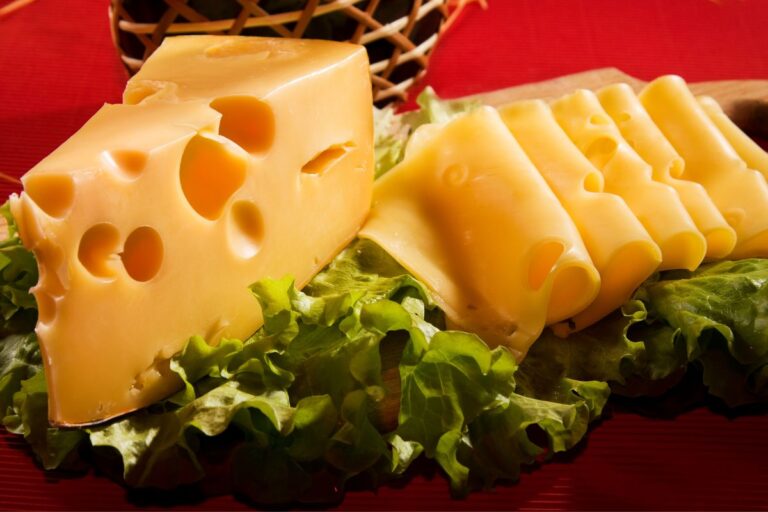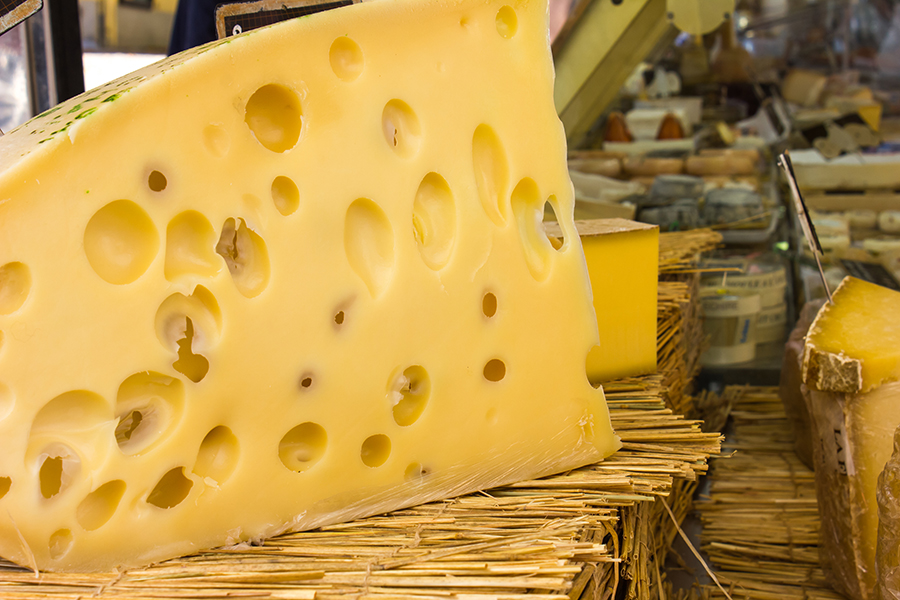
HEADLINES / Today / November 3, 2024
Why Does Swiss Cheese Have Holes Food Unwrapped
Why Does Swiss Cheese Have Holes? | Food Unwrapped - YouTube: Matt heads to Switzerland to find out why Swiss cheese has holes!Food Unwrapped Season 6 Episode 20Subscribe for more #FoodUnwrapped ️ http://bit.ly/FoodUnw.... The Scientific Reason Swiss Cheese Has Its Holes - Food Republic: The theory linking carbon dioxide to the holes does have a scientific basis, but it's not entirely accurate. In 1917, American scientist William Clark hypothesized that the bacteria present in milk used for Swiss cheese production released carbon dioxide, and this gas formation was responsible for creating the characteristic holes — also known as "eyes" — in the cheese..

Why Does Swiss Cheese Have Holes? - Coriander Queen
Scientists Have Finally Figured Out Why Swiss Cheese Has Holes: Now, the AFP reports that scientists have debunked a popular theory and discovered the real secret behind Swiss cheese’s holes — hay particles in milk. Though urban legend has it that mice eat .... The Missing Ingredient: Why Swiss Cheese Has Holes and Other ...: The Importance of CO2 Pressure. The pressure exerted by the carbon dioxide gas within the cheese is a critical factor in determining the size and shape of the holes. As the gas accumulates, it creates pressure that expands the bubbles within the curd.

Why Does Swiss Cheese Have Holes? | Wonderopolis
The balance between gas production and pressure determines the final appearance of the cheese.. Why Does Swiss Cheese Have Holes? The Real Reason ... - Kitchn: As the cheese ferments, this bacteria creates carbon dioxide, which turns into bubbles. When these bubbles pop, they form holes. In the cheese world, these holes are known as “eyes.”. The size of the eyes are determined by the temperature, storage, time, and acidity levels in the cheese. So the longer the cheese is fermented, the bigger the ....
Why Does Swiss Cheese Have Holes? Swiss Cheese Secrets: | By JCF ...
P. Shermanii: The Reason Swiss Cheese Has Holes: What makes Swiss cheese “holey” is additional bacteria called Propionibacterium freudenrichii subspecies shermanii – P. shermanii for short. Under the specific conditions that Swiss cheese is made, the P. shermanii produce a gas: carbon dioxide. Because Swiss cheese is made at a warm temperature – around 70 degrees Fahrenheit – the .... Why Does Swiss Cheese Have Holes? - Live Science: The holes — called “eyes” in the cheese-biz — are part of the Emmentaler-making process, which originated in the Emme River valley in Switzerland.

Why Does Swiss Cheese Have Holes? — Otium
Cheesemakers in other regions follow a .... Cracking The Code: Why Holes Appear In Swiss Cheese: The key to understanding the holes in Swiss cheese lies in the unique fermentation process it undergoes. The formation of holes in Swiss cheese is a complex process that involves the interplay of several factors. The holes in Swiss cheese are not merely a cosmetic quirk but rather the result of a carefully controlled fermentation process..

Why Does Swiss Cheese Have Holes? Scientists Discover The Real Answer | BGR
Why Does Swiss Cheese Have Holes? The Real Reason ... - Kitchn
As the cheese ferments, this bacteria creates carbon dioxide, which turns into bubbles. When these bubbles pop, they form holes. In the cheese world, these holes are known as “eyes.”. The size of the eyes are determined by the temperature, storage, time, and acidity levels in the cheese. So the longer the cheese is fermented, the bigger the ...
P. Shermanii: The Reason Swiss Cheese Has Holes
What makes Swiss cheese “holey” is additional bacteria called Propionibacterium freudenrichii subspecies shermanii – P. shermanii for short. Under the specific conditions that Swiss cheese is made, the P. shermanii produce a gas: carbon dioxide. Because Swiss cheese is made at a warm temperature – around 70 degrees Fahrenheit – the ...
Why Does Swiss Cheese Have Holes? - Live Science
The holes — called “eyes” in the cheese-biz — are part of the Emmentaler-making process, which originated in the Emme River valley in Switzerland. Cheesemakers in other regions follow a ...
Why Does Swiss Cheese Have Holes? | Food Unwrapped - YouTube
Matt heads to Switzerland to find out why Swiss cheese has holes!Food Unwrapped Season 6 Episode 20Subscribe for more #FoodUnwrapped ️ http://bit.ly/FoodUnw...
Scientists Have Finally Figured Out Why Swiss Cheese Has Holes
Now, the AFP reports that scientists have debunked a popular theory and discovered the real secret behind Swiss cheese’s holes — hay particles in milk. Though urban legend has it that mice eat ...
The Missing Ingredient: Why Swiss Cheese Has Holes and Other ...
The Importance of CO2 Pressure. The pressure exerted by the carbon dioxide gas within the cheese is a critical factor in determining the size and shape of the holes. As the gas accumulates, it creates pressure that expands the bubbles within the curd. The balance between gas production and pressure determines the final appearance of the cheese.
The Scientific Reason Swiss Cheese Has Its Holes - Food Republic
The theory linking carbon dioxide to the holes does have a scientific basis, but it's not entirely accurate. In 1917, American scientist William Clark hypothesized that the bacteria present in milk used for Swiss cheese production released carbon dioxide, and this gas formation was responsible for creating the characteristic holes — also known as "eyes" — in the cheese.
Cracking The Code: Why Holes Appear In Swiss Cheese
The key to understanding the holes in Swiss cheese lies in the unique fermentation process it undergoes. The formation of holes in Swiss cheese is a complex process that involves the interplay of several factors. The holes in Swiss cheese are not merely a cosmetic quirk but rather the result of a carefully controlled fermentation process.
Related for Why Does Swiss Cheese Have Holes Food Unwrapped
It is a capital mistake to theorize before one has data. Insensibly one begins to twist facts to suit theories, instead of theories to suit facts.
Keep Yourself Updated By Following Our Stories From The Whole World
Keep yourself updated with the latest stories from across the globe! Our platform brings you real-time insights and breaking news, covering everything from major world events to inspiring local stories. By following our stories, you’ll stay informed on a diverse range of topics and perspectives from around the world. Whether it’s political shifts, cultural milestones, or groundbreaking innovations, we ensure you’re always connected to what matters most. Dive into our global coverage and stay informed, no matter where you are!



